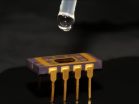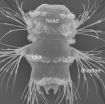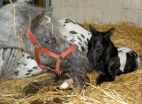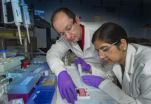(Press-News.org) Philadelphia, PA, June 11, 2014 – There are currently only two FDA-approved medications for the treatment of posttraumatic stress disorder (PTSD) in the United States. Both of these medications are serotonin uptake inhibitors. Despite the availability of these medications, many people diagnosed with PTSD remain symptomatic, highlighting the need for new medications for PTSD treatment.
The renin-angiotensin system has long been of interest to psychiatry. Some of the first drugs targeting this system were the angiotensin converting enzyme (ACE) inhibitors and angiotensin receptor blockers (ARBs), commonly prescribed treatments for high blood pressure.
In the 1990's, multicenter studies evaluating ACE inhibitors suggested that they improved quality of life as well as other medical outcomes, but these medications did not prove to be sufficiently effective for the treatment of psychiatric disorders to become established treatments.
Recently, however, investigators at Emory University observed that individuals diagnosed with PTSD, and who happened to also be treated with ARBs or ACE inhibitors, exhibited fewer PTSD-like symptoms.
This led the researchers to investigate the underlying mechanisms using an animal model of PTSD in order to expand upon this clinical finding.
Dr. Paul Marvar, first author and Assistant Professor at The George Washington University, explains their findings, "Our current preclinical results show that the ARB losartan, given acutely or chronically to mice, enhances the extinction of fear memory, a process that is disrupted in individuals with PTSD. Overall these data provide further support that this class of medications may have beneficial effects on fear memory in PTSD patients."
Fear extinction is a process by which a memory associated with fear is gradually 'overwritten' in the brain by a new memory with no such association. For example, exposure therapy is a form of fear extinction, whereby repeatedly exposing a patient in a safe manner to a feared object or situation slowly reduces or eliminates their fear. A medication that could potentially enhance the extinction of fear would be welcome to the millions of individuals who continue to suffer with symptoms of PTSD.
"It is exciting to see the renin-angiotensin being explored in new ways in the search for new treatment for PTSD," commented Dr. John Krystal, Editor of Biological Psychiatry. "There is a tremendous need for more effective treatments for PTSD symptoms."
Future studies are still necessary before clinical use could be recommended, but there is hope that by targeting this pathway, it may provide a safe and powerful adjunctive novel therapy for the treatment of PTSD.
INFORMATION:
The article is "Angiotensin Type 1 Receptor Inhibition Enhances the Extinction of Fear Memory" by Paul J. Marvar, Jared Goodman, Sebastien Fuchs, Dennis C. Choi, Sunayana Banerjee, Kerry J. Ressler (DOI: 10.1016/j.biopsych.2013.08.024). The article appears in Biological Psychiatry, Volume 75, Issue 11 (June 1, 2014), published by Elsevier.
Notes for editors
Full text of the article is available to credentialed journalists upon request; contact Rhiannon Bugno at +1 214 648 0880 or Biol.Psych@utsouthwestern.edu. Journalists wishing to interview the authors may contact Dr. Paul Marvar at +1 (202) 994 5584 or pmarvar@gwu.edu.
The authors' affiliations, and disclosures of financial and conflicts of interests are available in the article.
John H. Krystal, M.D., is Chairman of the Department of Psychiatry at the Yale University School of Medicine, Chief of Psychiatry at Yale-New Haven Hospital, and a research psychiatrist at the VA Connecticut Healthcare System. His disclosures of financial and conflicts of interests are available here.
About Biological Psychiatry
Biological Psychiatry is the official journal of the Society of Biological Psychiatry, whose purpose is to promote excellence in scientific research and education in fields that investigate the nature, causes, mechanisms and treatments of disorders of thought, emotion, or behavior. In accord with this mission, this peer-reviewed, rapid-publication, international journal publishes both basic and clinical contributions from all disciplines and research areas relevant to the pathophysiology and treatment of major psychiatric disorders.
The journal publishes novel results of original research which represent an important new lead or significant impact on the field, particularly those addressing genetic and environmental risk factors, neural circuitry and neurochemistry, and important new therapeutic approaches. Reviews and commentaries that focus on topics of current research and interest are also encouraged.
Biological Psychiatry is one of the most selective and highly cited journals in the field of psychiatric neuroscience. It is ranked 4th out of 135 Psychiatry titles and 13th out of 251 Neurosciences titles in the Journal Citations Reports® published by Thomson Reuters. The 2012 Impact Factor score for Biological Psychiatry is 9.247.
About Elsevier
Elsevier is a world-leading provider of information solutions that enhance the performance of science, health, and technology professionals, empowering them to make better decisions, deliver better care, and sometimes make groundbreaking discoveries that advance the boundaries of knowledge and human progress. Elsevier provides web-based, digital solutions — among them ScienceDirect, Scopus, Elsevier Research Intelligence and ClinicalKey — and publishes nearly 2,200 journals, including The Lancet and Cell, and over 25,000 book titles, including a number of iconic reference works.
The company is part of Reed Elsevier Group PLC, a world-leading provider of professional information solutions in the Science, Medical, Legal and Risk and Business sectors, which is jointly owned by Reed Elsevier PLC and Reed Elsevier NV. The ticker symbols are REN (Euronext Amsterdam), REL (London Stock Exchange), RUK and ENL (New York Stock Exchange).
Media contact
Rhiannon Bugno
Editorial Office
2+1 214 648 0880
Biol.Psych@utsouthwestern.edu
A common hypertension treatment may reduce PTSD symptoms
Reports new study in Biological Psychiatry
2014-06-11
ELSE PRESS RELEASES FROM THIS DATE:
Chemical sensor on a chip
2014-06-11
This news release is available in German. They are invisible, but perfectly suited for analysing liquids and gases; infrared laser beams are absorbed differently by different molecules. This effect can for instance be used to measure the oxygen concentration in blood. At the Vienna University of Technology, this technique has now been miniaturized and implemented in the prototype for a new kind of sensor.
Specially designed quantum cascade lasers and light detectors are created by the same production process. The gap between laser and detector is only 50 micrometres. ...
Eye evolution: A snapshot in time
2014-06-11
This news release is available in German. Larvae of the marine bristle worm Platynereis dumerilii orient themselves using light. Early in their development, these larvae swim towards the light to use surface currents for their dispersal. Older larvae turn away from the light and swim to the sea floor where they develop into adult worms. Scientists of the Max Planck Institute for Developmental Biology in Tübingen have discovered that this change in the behavioural response to light is coupled to different neuronal systems underlying the eyes. The scientists have reconstructed ...
Foaling mares are totally relaxed -- no stress
2014-06-11
Foaling in horses is extremely fast. Labour and the active part of foaling, resulting in delivery of the foal, take 10 to 20 minutes and are considerably shorter than giving birth in humans or in cows. Is this brief period stressful for the animals or are horses more relaxed than humans when giving birth? This issue has been addressed by Christina Nagel and colleagues, who closely observed 17 foalings at the Brandenburg State Stud in Neustadt (Dosse), Germany, as well as recording electrocardiograms before, during and after foaling. The researchers also took samples of ...
Making new species without sex
2014-06-11
This news release is available in German. Occasionally, two different plant species interbreed with each other in nature. This usually causes problems since the genetic information of both parents does not match. But sometimes nature uses a trick. Instead of passing on only half of each parent's genetic material, both plants transmit the complete information to the next generation. This means that the chromosome sets are totted up. The chromosomes are then able to find their suitable partner during meiosis, a type of cell division that produces an organism's reproductive ...
Having authoritarian parents increases the risk of drug use in adolescents
2014-06-11
Alcohol, tobacco and cannabis use is very widespread among youths in Spain compared to the majority of European countries, according to the latest data from the European Monitoring Centre for Drugs and Drug Addiction.
An international team, led by the European Institute of Studies on Prevention (IREFREA) with headquarters in Mallorca, together with other European and Spanish universities (Oviedo, Santiago de Compostela and Valencia), has analysed the role that parents play at the time of determining the risk of their children using alcohol, tobacco and cannabis in six ...
Herpes infected humans before they were human
2014-06-11
Researchers at the University of California, San Diego School of Medicine have identified the evolutionary origins of human herpes simplex virus (HSV) -1 and -2, reporting that the former infected hominids before their evolutionary split from chimpanzees 6 million years ago while the latter jumped from ancient chimpanzees to ancestors of modern humans – Homo erectus – approximately 1.6 million years ago.
The findings are published in the June 10 online issue of Molecular Biology and Evolution.
"The results help us to better understand how these viruses evolved and found ...
Canadian physicians lack knowledge and confidence about breastfeeding
2014-06-11
OTTAWA, Ontario – June 11, 2014 –The results of a national research project to assess breastfeeding knowledge, confidence, beliefs, and attitudes of Canadian physicians are available today in the Journal of Human Lactation.
"Physicians' attitudes and recommendations are known to directly impact the duration that a mom breastfeeds," said Dr. Catherine Pound, pediatrician and lead author of the study at the Children's Hospital of Eastern Ontario (CHEO). "Worldwide healthcare organizations readily promote the benefits of breastfeeding, and yet now we find a gap exists where ...
Researchers identify regulation process of protein linked to bipolar disorder
2014-06-11
BOSTON (June 11, 2014) — Researchers from Tufts have gained new insight into a protein associated with bipolar disorder. The study, published in the June 3 issue of Science Signaling, reveals that calcium channels in resting neurons activate the breakdown of Sp4, which belongs to a class of proteins called transcription factors that regulate gene expression.
This study, led by Grace Gill, identifies a molecular mechanism regulating Sp4 activity. Her previous research had determined that reduced levels of Sp4 in the brain are associated with bipolar disorder. Her work ...
DNA-linked nanoparticles form switchable 'thin films' on a liquid surface
2014-06-11
UPTON, NY—Scientists seeking ways to engineer the assembly of tiny particles measuring just billionths of a meter have achieved a new first—the formation of a single layer of nanoparticles on a liquid surface where the properties of the layer can be easily switched. Understanding the assembly of such nanostructured thin films could lead to the design of new kinds of filters or membranes with a variable mechanical response for a wide range of applications. In addition, because the scientists used tiny synthetic strands of DNA to hold the nanoparticles together, the study ...
Scientists unravel the genetic secrets of nature's master of mimicry
2014-06-11
Scientists investigating how one of the greatest shape shifters in the natural world is able to trick predators to avoid being eaten have identified the gene behind the fascinating feat.
The African Swallowtail butterfly, also known as the 'Mocker Swallowtail' or the 'Flying Handkerchief,' can appear to change both colour and shape.
Males of the species fly boldly around the tree tops, their rapid flight making them look like shaking handkerchiefs, however females lurk in the bushes and pretend to be examples of Monarch butterflies that are nasty to eat.
The females ...
LAST 30 PRESS RELEASES:
Brainwaves of mothers and children synchronize when playing together – even in an acquired language
A holiday to better recovery
Cal Poly’s fifth Climate Solutions Now conference to take place Feb. 23-27
Mask-wearing during COVID-19 linked to reduced air pollution–triggered heart attack risk in Japan
Achieving cross-coupling reactions of fatty amide reduction radicals via iridium-photorelay catalysis and other strategies
Shorter may be sweeter: Study finds 15-second health ads can curb junk food cravings
Family relationships identified in Stone Age graves on Gotland
Effectiveness of exercise to ease osteoarthritis symptoms likely minimal and transient
Cost of copper must rise double to meet basic copper needs
A gel for wounds that won’t heal
Iron, carbon, and the art of toxic cleanup
Organic soil amendments work together to help sandy soils hold water longer, study finds
Hidden carbon in mangrove soils may play a larger role in climate regulation than previously thought
Weight-loss wonder pills prompt scrutiny of key ingredient
Nonprofit leader Diane Dodge to receive 2026 Penn Nursing Renfield Foundation Award for Global Women’s Health
Maternal smoking during pregnancy may be linked to higher blood pressure in children, NIH study finds
New Lund model aims to shorten the path to life-saving cell and gene therapies
Researchers create ultra-stretchable, liquid-repellent materials via laser ablation
Combining AI with OCT shows potential for detecting lipid-rich plaques in coronary arteries
SeaCast revolutionizes Mediterranean Sea forecasting with AI-powered speed and accuracy
JMIR Publications’ JMIR Bioinformatics and Biotechnology invites submissions on Bridging Data, AI, and Innovation to Transform Health
Honey bees navigate more precisely than previously thought
Air pollution may directly contribute to Alzheimer’s disease
Study finds early imaging after pediatric UTIs may do more harm than good
UC San Diego Health joins national research for maternal-fetal care
New biomarker predicts chemotherapy response in triple-negative breast cancer
Treatment algorithms featured in Brain Trauma Foundation’s update of guidelines for care of patients with penetrating traumatic brain injury
Over 40% of musicians experience tinnitus; hearing loss and hyperacusis also significantly elevated
Artificial intelligence predicts colorectal cancer risk in ulcerative colitis patients
Mayo Clinic installs first magnetic nanoparticle hyperthermia system for cancer research in the US
[Press-News.org] A common hypertension treatment may reduce PTSD symptomsReports new study in Biological Psychiatry





